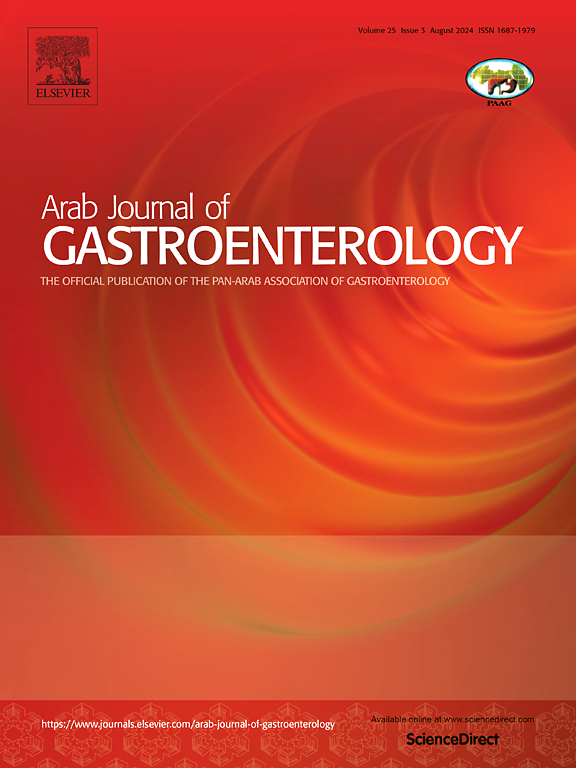结直肠癌预后分类和免疫抑制靶点的铁下垂和热下垂联合特征的鉴定和验证。
IF 1.1
4区 医学
Q4 GASTROENTEROLOGY & HEPATOLOGY
引用次数: 0
摘要
背景与研究目的:铁腐和焦腐是细胞死亡的两种形式,在癌症生物学中起着关键作用,近年来越来越多的报道报道。然而,对结直肠癌(CRC)中嗜铁-焦亡(FPtosis)联合相关基因特征的了解仍然有限。材料和方法:我们对CRC中fptosis相关的签名进行了全面的调查。对来自训练组和验证组的数据进行整合。建立了fptosis相关签名。我们通过Kaplan-Meier分析以及单变量和多变量Cox回归模型评估了该特征的预后意义。进行功能分析以探索潜在的生物学机制。此外,我们分析了fptosis相关特征、免疫浸润和免疫检查点阻断(ICB)免疫治疗之间的相关性。结果:fptosis相关特征显示出显著的预后潜力,可以作为预测预后的独立生物标志物。该特征与肿瘤分期、浸润深度、淋巴结转移和远处转移有关。亚组分析显示fptosis相关特征在预测不同临床亚组的生存方面具有重要的预测作用,包括年龄、性别、肿瘤分期、侵袭深度、淋巴结转移状态和远处转移状态。此外,该特征与炎症和多种免疫细胞(如中性粒细胞、M0和M2巨噬细胞以及调节性T细胞(Tregs))的浸润呈正相关。在微卫星不稳定(MSI) CRC中,大多数ICB基因在高fptosis组的表达高于低fptosis组。结论:FPtosis标记可以有效预测结直肠癌的预后,并具有促进创新治疗策略发展的潜力。本文章由计算机程序翻译,如有差异,请以英文原文为准。
Identification and verification of a combined ferroptosis- and pyroptosis-related signature for a prognostic classifier and immunosuppressive targets in colorectal cancer
Background and study aims
Ferroptosis and pyroptosis, two forms of cell death, are increasingly reported for their pivotal roles in cancer biology. However, the understanding of the combined ferroptosis-pyroptosis (FPtosis)-related gene signature in colorectal cancer (CRC) remains limited.
Material and methods
We conducted a comprehensive investigation of the FPtosis-related signature in CRC. Data integration from both the training and validation cohorts was performed. The FPtosis-related signature was established. We evaluated the prognostic significance of the signature through Kaplan-Meier analysis, as well as univariate and multivariate Cox regression models. Functional analyses were conducted to explore the underlying biological mechanisms. Additionally, we analyzed the correlations between the FPtosis-related signature, immune infiltration, and immune checkpoint blockade (ICB) immunotherapy.
Results
The FPtosis-related signature demonstrated significant prognostic potential and can serve as an independent biomarker for predicting outcomes. The signature showed correlations with advanced tumor stage, invasion depth, lymph node metastasis, and distant metastasis. Subgroup analyses revealed the valuable predictive role of the FPtosis-related signature in predicting survival across different clinical subgroups, including age, gender, tumor stage, invasion depth, lymph node metastasis status, and distant metastasis status. Moreover, the signature exhibited positive associations with inflammation and the infiltration of diverse immune cells, such as neutrophils, M0 and M2 macrophages, and regulatory T cells (Tregs). In microsatellite instable (MSI) CRC, the expression of most ICB genes was higher in the high-FPtosis group compared to the low-FPtosis group.
Conclusion
The FPtosis signature can effectively predict the prognosis of CRC and had the potential to improve the development of innovative therapeutic strategies.
求助全文
通过发布文献求助,成功后即可免费获取论文全文。
去求助
来源期刊

Arab Journal of Gastroenterology
Medicine-Gastroenterology
CiteScore
2.70
自引率
0.00%
发文量
52
期刊介绍:
Arab Journal of Gastroenterology (AJG) publishes different studies related to the digestive system. It aims to be the foremost scientific peer reviewed journal encompassing diverse studies related to the digestive system and its disorders, and serving the Pan-Arab and wider community working on gastrointestinal disorders.
 求助内容:
求助内容: 应助结果提醒方式:
应助结果提醒方式:


